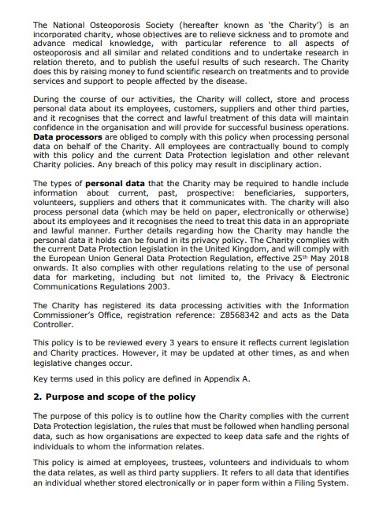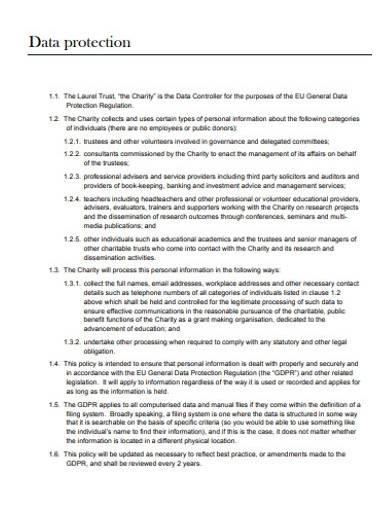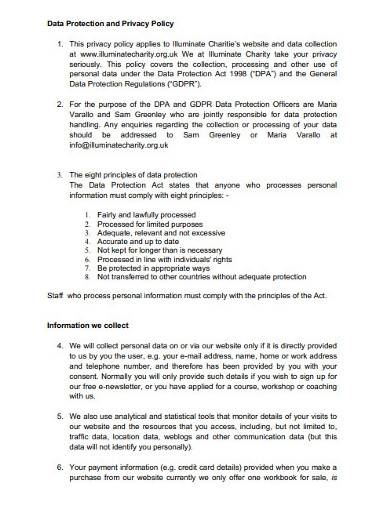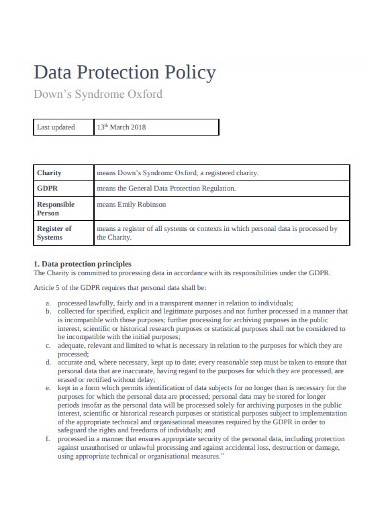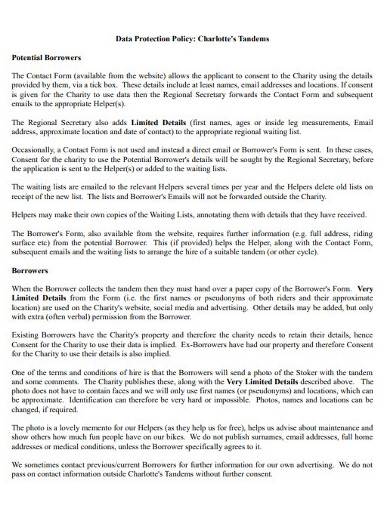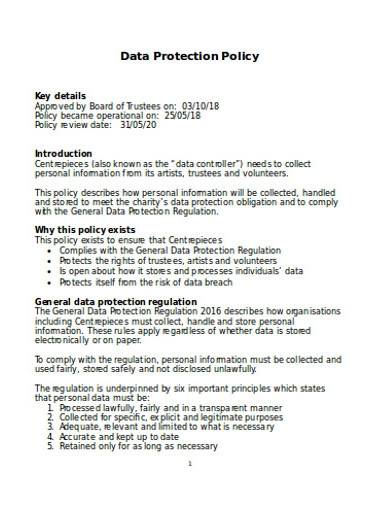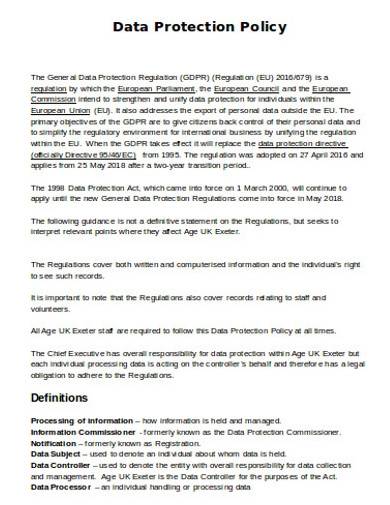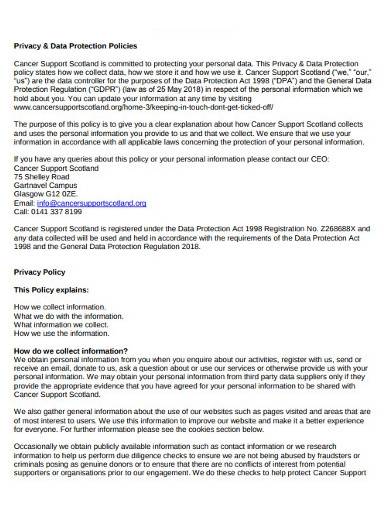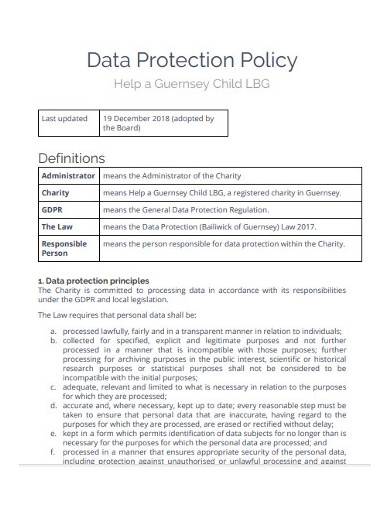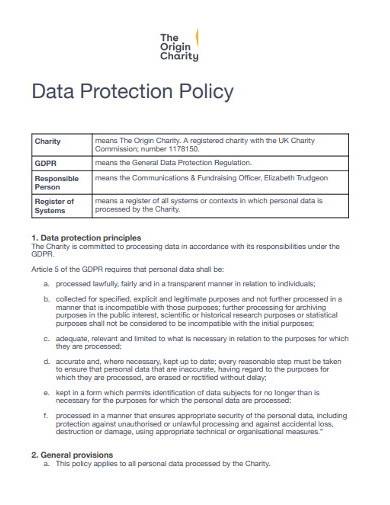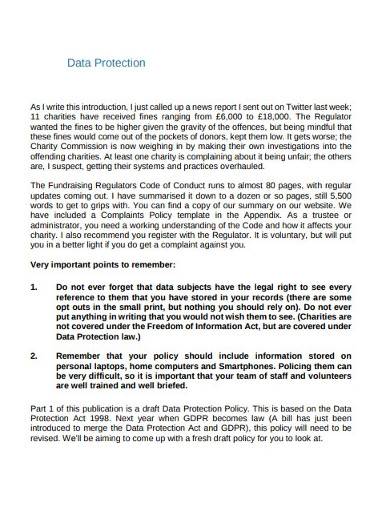In this generation, transmitting data and information had become easier than before, but so as misusing it. That’s why countries and states have passed data protection bills, acts, and regulations, all vary on the core, limitations, and inclusions of the data that it protects. Although the most common subjects of these laws, policies, and regulations are children and minors, some specify in protecting the private information of company and organization members, including those in charities. So, for your charity organization to ensure that everyone involved, every member, volunteer, and recipient, knows of your goal to protect private data, make a charity data protection policy now. Don’t know where to start? Then make use of our policy samples and templates below today!
FREE 10+ Charity Data Protection Policy Samples & Templates in MS Word | PDF
1. Charity Data Information Protection Policy
2. Charity Data Protection Policy Template
3. Sample Charity Staff Data Protection Policy
4. Data Protection Policy Template
5. Charity Data Protection Policy Sample
6. Data Regulation Protection Policy
7. Basic Charity Data Protection Policy
8. Charity Privacy & Data Protection Policy
9. Standard Charity Data Protection Policy
10. Professional Charity Data Protection Policy
11. General Charity Data Protection Policy
How to Develop an Effective Charity Data Protection Policy
According to Noah Ramirez, JD / CIPP of Osana Inc., there are 3 different data privacy and protection laws that business owners, website operators, and anyone should take note of. The first is the US data privacy protection laws, followed by the state privacy laws, and lastly, the international privacy laws. Once you know the laws that would most likely govern your organization or charity, then it’s time you begin making your policy. Also, keep the following tips in mind as you proceed to enlist what your charity organization’s members must adhere to in the duration of their services:
1. Specify Your Reasons and Make an Outline
Ask yourself why you are making the policy and why your charity organization needs one. By knowing your reasons, you’ll be able to identify what your objectives or goals are. And once you have decided on your final purpose and objectives, you can proceed to outline your policy. It should have the statements, terms, and every detail that you want to include in your policy, as well as the designs and branding needs of your organization.
2. Don’t Be Vague
Ever read a terms and conditions agreement of a software application program? Or maybe one that’s provided to you by a company or an employer? Well, most often, there are vague phrases and words used in the agreement or those which are too legalistic that the ordinary people can’t comprehend. Obviously, you don’t want to make that same mistake for your charity organization, right? So, you should avoid using vague words and jargon that limits the understanding of your target audience and readers. And if there’s really a need for you to state complicated terms, then include their meanings or definitions in parentheses, so that your readers will be able to understand each policy.
3. Review the Legal Requirements You Need to Fulfill
Some states require you to add specific rules to meet a particular law, and there are lots of varying laws that govern charities. So, to make sure that your policies are not contradicting the state’s and country’s laws, you should make yourself knowledgeable of it. On the one hand, hiring an expert, such as an attorney, can also be the best option to take if you are in a hurry to make your policies.
FAQ’s
What is a charity data protection policy?
A charity data protection policy is a set of rules and regulations that you mandate in your organization. Unlike common policies, such as keeping the organization’s office neat and clean, these policies focus on protecting unintended and illegal use of the charity’s confidential data. Also, it aims to ensure that only authorized individuals can access specific data and information about the charity. The bank account statement and information of donors and sponsors is one of the essential pieces of data that can be protected with the policy.
Why do charity data protection policies matter?
Risk management is one of the reasons why data protection policies matter in a charitable or nonprofit organization. Without policies, there’s a likelihood that the members and volunteers of the charitable organization will not be able to handle private information with confidentiality. So, breach and misuse become rampant that can then risk the identities and data of the involved.
Is it okay to not write the data protection policies of my charity, but still remind my members verbally on a regular basis?
The Swenseth Law Office of North Dakota specified that “a well-written contract is the cornerstone of a successful project…”. And that quote is also applicable in the field of making policies, particularly for your charity organization and members. Although you can verbally state your rules about keeping private and confidential data, you will not be able to have an assurance that everyone can remember each detail of what you spoke or announced. Therefore, always choose to get it in writing, and overall, avoid verbal contracts, agreements, rules, and policies.
Private data and information should, at all times, be secured and protected regardless of the type of organization that holds it, be it a charitable group or not. Also, when it comes to releasing these pieces of information, the assigned officer should require the presentation of an approved authorization request before disclosing any data to the requesting member or volunteer. And after the data gets released, the officer should record the name of the authorized requestor and state the details of the release for documentation purposes.
Related Posts
Sample Non Profit Proposal Template
FREE 10+ Sample Donation Receipts in MS Word PDF
Program Evaluation Form
FREE 9+ Donation Request Letter Templates in MS Word PDF
Sample Corporate Sponsorship Letter
FREE 10+ Sample Donation Request Forms in PDF MS Word
Sample Donation Form
Benefit Flyer Template
FREE 8+ Thank You Letter Samples in PDF MS Word
FREE 9+ Nonprofit Business Plan Samples in PDF MS Word
FREE 9+ Nonprofit Proposal Samples in PDF MS Word
FREE 6+ Sample Thank You Letter For Donation in MS Word PDF
FREE 6+ Sample Fund-raiser Thank You Letter Templates in PDF
FREE 6+ Sample Donation Request Letter Templates in MS Word ...
FREE 11+ Sample Fundraising Plan Templates in MS Word PDF

